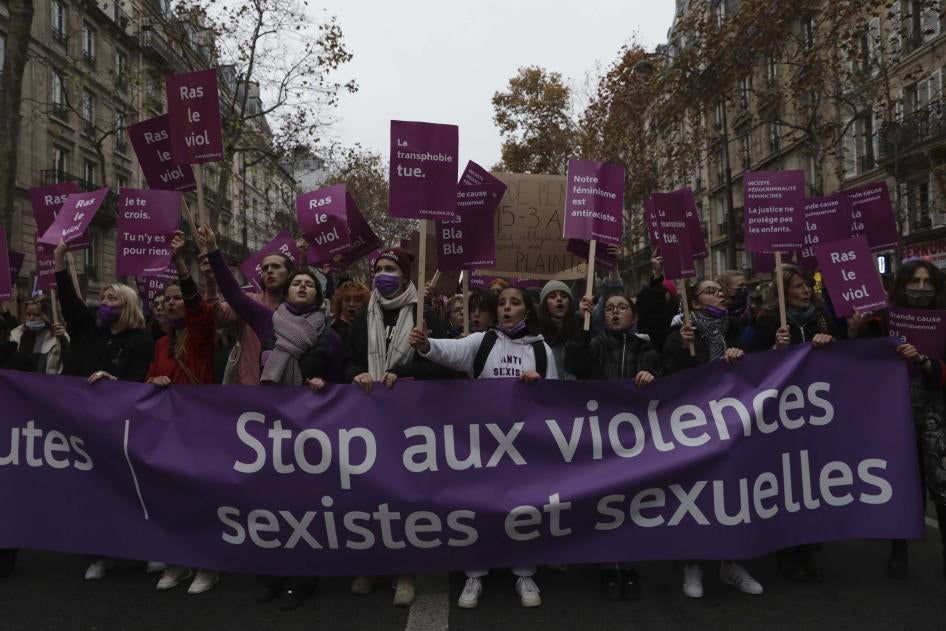To the candidates at the French presidential election,
The presidential election is an opportunity to prove that the struggle to end violence against women is not just symbolic. It is urgent that presidential candidates pledge to address the needs of those who have faced sexual and gender-based violence in the workplace, or domestic abuse that affects their working lives. In a 2019 survey by the French Institute of Public Opinion (Ifop) 30 percent of women polled had experienced sexual harassment or assault in the workplace.
On June 21, 2019, against the backdrop of the #MeToo and #BalanceTonPorc social movements, the International Labor Organization (ILO) adopted the first binding international norms to eliminate violence and harassment in the workplace. Thanks to the mobilization of feminist associations, nongovernmental groups and trade union movements, this pioneering convention requires governments and employers to adopt systematic measures to prevent sexual harassment in the workplace and to provide protection for survivors.
Parliament adopted a bill in 2021 to enable France to ratify this treaty, but its requirements have not been included in French law despite the urging of trade unions, nongovernmental groups, and feminist groups.
Ratification of the convention without greater legislative changes, is only the first step. Without changes at the national level, ratification is only symbolic. It is essential to modify national law to support the treaty. As the statistics demonstrate, current laws are insufficient to fight concretely and effectively against gender-based violence.
As presidential candidates, you should make a commitment to put in place a solid legislative arsenal and the necessary human and financial resources to put an end to the violence in the workplace that harms, breaks, and humiliates women.
It is necessary to ensure that survivors will be defended and supported in the workplace. This should be done by extending the prerogatives and means of the Social and Economic Committee. We also need compulsory awareness-raising and training for all employees and staff representatives at all levels throughout the supply chains of all French companies.
The future government also needs to be able to sanction companies that do not set up mandatory plans to address sexual violence and harassment in the workplace.
Furthermore, no provision exists in French law to secure the employment of survivors of domestic violence, whose economic independence may be at stake. The workplace should be a resource and a place of support for them. It is urgent to create new protections for survivors, in line with the measures already in effect in New Zealand and Spain. To guarantee their right to work, companies should be barred from dismissing them, as well as barred from dismissing other victims of workplace harassment. Flexible work arrangements should be allowed to meet victims’ needs, including where possible, to choose functional or geographical mobility, to adjust working hours, and to provide free mental health support to protect them and to enable them to take legal or social steps against their abusers.
The ILO Convention shows that it is essential to pay particular attention to risk factors exposing workers to violence and harassment at their workplace. The transposition of the C190 into French law should therefore include specific measures to protect groups or sectors considered to be most at risk, such as precarious workers, migrants, people with disabilities, LGBTQI+ people, as well as isolated, domestic, or night-time professions.
Gender-based and sexual violence and harassment is everywhere, all the time. These specific actions are urgently needed to ensure the safety of women and groups most at risk of violence and harassment in the workplace and to truly address their needs. Presidential candidates should take note and speak out to promise to make these protections a reality.
Signatories:
Françoise Vinson, Vice-President of ActionAid France
Philippe Lévêque, General Director of CARE France
Philippe Martinez, Secretary General of the CGT
Bénédicte Jeannerod, France Director of Human Rights Watch
Yuna Miralles, Member of the national coordination of #NousToutes
Fawzia Baba-Aissa, Development Officer of the Fund for Women in the Mediterranean (FFMED)
Sarahi Gutierrez, Director of BATIK International
Alice Apostoly, Co-President of the Gender Institute in Geopolitics
Rana Hamra, Executive Director of Humanity Diaspo NGO
Catherine Sophie Dimitroulias, President of the Association of Women of Southern Europe (AFEM)
Sadia Benhamou, President of the Association "Les Ateliers du Travail"
Roselyne Rollier, President of the Maison des Femmes Thérèse Clerc
Julie Ferrua, National Secretary in charge of women's issues, LGBTQI+, immigration, and disability of the Union Syndicale Solidaires
Suzy Rojtman, Spokesperson for the National Collective for Women's Rights
Jean Michel Taliercio, Project Manager of Dans le genre Egales
Séverine Lemiere, President of the Association FIT une femme un toit







